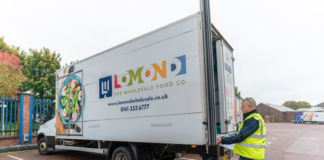Atif Rashid is the director of Alfa Wholesale in Glasgow. In our sixth interview of the Great Scots series, Atif discusses the investments he has made to keep up with the competition.

director, Alfa Wholesale
A year ago, Alfa Wholesale reopened its doors for the first time after enduring a devastating fire, which saw its depot having to be rebuilt from scratch. Today, the business is back on track and already turning over £21m a year, compared with £28m before the fire. It is even attracting new business, following the introduction of a delivery service.
Glasgow is fiercely competitive so how do you differentiate your business?
Our key differentiator is our ethnic foods range for both retailers and caterers. It’s unrivalled in Scotland. Our FMCG range might not be as wide as some of our competitors’ ranges, but because we work hard to maintain low overheads, we can keep our prices low and consistent. We only have 16,000sq ft to play with and we make every inch of that space work hard.
We are also members of Today’s Group, which adds professionalism to what we do.
You launched a delivery service last August. What inspired that?
We were seeing more and more customers asking for their orders to be delivered, but we couldn’t respond. At one point, we had to turn down a customer who owned six restaurants. So last August we decided to jump in by hiring a van and using our own staff. Today we are doing 15‑20 drops per day and charge a flat rate of £10. It’s helping us to attract new customers who say they like our range and our honest, transparent approach to pricing.
What does this mean for the cash & carry?
We’re not convinced that the cash & carry model is dead – we know all our customers really well, which is one of the reasons we’ve come back strongly in such a competitive environment, even after being closed for a year: our customers are loyal. The delivered option, while it has its strengths, is less personal.
You’ve invested in freezer cabinets – how important is chilled and frozen to your business?
Fast Facts
Size of depot: 16,000sq ft
£21m Turnover – compared with £28m in the year before the devastating fire
Buying group: Today’s Group
8,000 SKUs
Fastest growing category: ethnic and world foods
Our new drive-in cold room was a five-figure investment – but it’s worth it, especially in Glasgow where people like to eat a lot of chips!
I think that retailers can do more with the chilled and frozen category – a retailer might have a fridge with drinks because a supplier gave it to them, but they’re not very adventurous outside of that. There’s so much more you could be selling in your chiller.
What are your views on plain packaging?
How will it affect your business? Tobacco is not very profitable for wholesalers in Glasgow – our margins are very slim and there are a lot of overheads involved. I think the display ban and plain packaging might have a positive impact on the category in some ways: at the moment, suppliers are launching a lot of new products, which can be difficult for wholesalers and retailers to accommodate; if plain packaging happens, a lot of SKUs will be reduced, which will make it easier to manage.
How about price-marks?
In some ways, they’re a necessary evil, because if retailers put their prices up, the consumer often won’t trust them, but if a supplier puts its prices up, the consumer won’t ask any questions. So a price-mark with a good margin for the retailer will always be successful.
What would you do if you have £100k to spend on your business?
I’d probably invest it in putting in place the systems and processes to enable us to develop a much slicker delivered operation.







